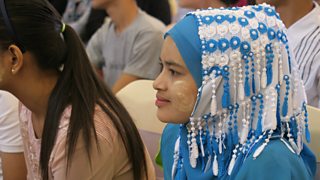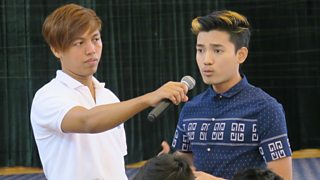Myanmar: Our Wish, Our Question
Yan Htaik Seng
Project Manager
We recount a nerve-racking visit to Myanmar’s ethnically diverse Kayin State - as it recovers from years of conflict - to give young people a rare chance to voice their opinions and question their leaders.
Rain is sparkling in a pool, reflecting the lush, green mountains behind it. I’m in Kayin State, south-eastern Myanmar the day before our youth radio debate and despite the peaceful surroundings I am worried.
We’ve invited four high-profile panellists – a government minister, a youth activist, a speaker from a political organisation, and a newly elected MP – all of whom have agreed to face questions from a group of young people. Several questions flash through my mind: Will the panellists show up? What sort of questions will be asked? Will our debate be shut down?
This is the first ever youth radio debate to be held in Kayin state. The debate, the second in a three-part series of – 主播大秀 Media Action’s youth radio programme - on the 主播大秀 Burmese Service. It aims to bring youth voices onto Myanmar’s airwaves and support young people to participate in political discussion and debate at regional and national levels.

A girl listens to a question at an LLKS debate in Kayin State, Myanmar
This is also the first September under a new government led by Aung San Suu Kyi, whose book Freedom from Fear greatly inspired me when I first found it in the reference section of the British Council library in Yangon in 2007. In the quiet of that library I discovered the concepts of freedom and democracy.
Almost 10 years later, new hope is in the air under a new government in Kayin state, one of Myanmar’s most ethnically diverse areas, wracked by religious tension, poverty and one of the world’s longest civil wars. With a ceasefire agreed between the Kayin National Union (KNU) and the Myanmar government in late 2015, and the first ever national peace dialogue being held in the country’s capital this month, questions remain for the young people of Kayin state. Will they be able to find jobs? Will they be able to express their opinions and ask questions of their leaders? Will they be free from fear in this new Myanmar? Will this peace be sustainable?
Facing our own questions
Nervous and quiet, I’m now on my way, with the LLKS lead producer Su Myat Mon, after being summoned to the Kayin state government office. Having lived in fear for most of our lives, like many ordinary citizens in this country, we know that when dealing with authority anything can happen.
Before I’m done preparing my mind to be calm, our car reaches the government office. The officials are nervous of the media and want to know more about our event. In the ensuing discussion we are relieved as their intentions seem benign and in the end, we are only left to worry about whether all the panellists will turn up tomorrow.
The next day, under a banner asking “How can we create jobs for youth in Kayin state?” the panel and audience arrive. The 56-strong-audience of young people ask politely-worded, yet strong and impassioned questions on a wide range of issues, from jobs and education, to the need for a decent living wage and an end to gender discrimination in the workforce.

Kaung Min Thant asks a question at a LLKS youth debate in Kayin State, Myanmar
For me one question stands out: “The KNU and government armies have been fighting in the past in Kayin state. People take refuge in our neighboring country Thailand” said 20-year-old, Kaung Min Thant.
“They want to come back to work in Kayin state. They want to apply for a job in government departments. But they’re asked whether they have passed high school or university. As they are not a high school or university graduate, will they have to live all their life in a refugee camp? Will they have to work as low-level labourers in another country? Will they not have a chance to come back to this state?”
The panellists of course do not have all the answers but respond with their own hopes, ideas and commitments for future change. At the end of the debate there were many questions left in the minds of the audience members, who are keen to keep asking, discussing and debating.
We have now left behind the Zwekapin mountain ranges and are passing through green fields of rice hoping for a light of hope from the new government and a brighter future for this land which has suffered much from darkness in the past. The questions from the debate still echo in my mind. I personally hope this unique event will help to create a culture where all youth who participated in the show and listened to it throughout Myanmar will be able to pursue their dreams and enjoy freedom from fear.
Related links
Follow us on , and
